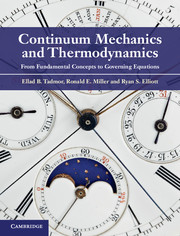Book contents
- Frontmatter
- Contents
- Preface
- Acknowledgments
- Notation
- 1 Introduction
- Part I Theory
- Part II Solutions
- 8 Universal equilibrium solutions
- 9 Numerical solutions: the finite element method
- 10 Approximate solutions: reduction to the engineering theories
- 11 Further reading
- Appendix A Heuristic microscopic derivation of the total energy
- Appendix B Summary of key continuum mechanics equations
- References
- Index
9 - Numerical solutions: the finite element method
from Part II - Solutions
Published online by Cambridge University Press: 05 February 2012
- Frontmatter
- Contents
- Preface
- Acknowledgments
- Notation
- 1 Introduction
- Part I Theory
- Part II Solutions
- 8 Universal equilibrium solutions
- 9 Numerical solutions: the finite element method
- 10 Approximate solutions: reduction to the engineering theories
- 11 Further reading
- Appendix A Heuristic microscopic derivation of the total energy
- Appendix B Summary of key continuum mechanics equations
- References
- Index
Summary
The rapid growth of computer power since the 1960s has been accompanied by a similarly rapid growth and development of computational methods, to the point where the stress analysis of complex components is a routine part of almost any engineering design. To demonstrate how continuum mechanics problems can be accurately and efficiently solved by an approximate numerical representation on a computer, we will focus on the solution of static problems in solid mechanics, and we will not consider the effects of temperature. While there is certainly no shortage of numerical techniques to solve fluid mechanics, heat transfer or other continuum problems, our focus on solids reflects the emphasis of this book in general. And while we will start out on a relatively general footing applicable to many of the computational techniques available for solid mechanics, our focus will be on the finite element method (FEM). This is because the FEM has clearly emerged as the most common and powerful approach for solid mechanics and materials science. Further, we view the FEM as a natural bridge between continuum mechanics and atomistic methods. In Part IV of the companion book to this one [TM11], we explicitly use it as a way to build multiscale models combining atomistic and continuum frameworks.
A perusal of Chapter 11 on Further Reading makes it clear that the FEM is a subject that can easily fill an entire book on its own.
Information
- Type
- Chapter
- Information
- Continuum Mechanics and ThermodynamicsFrom Fundamental Concepts to Governing Equations, pp. 277 - 316Publisher: Cambridge University PressPrint publication year: 2011
